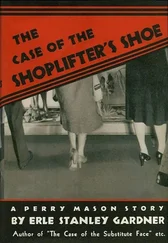My only way of identifying him was from his clothes. It was the same suit of quiet brown with a white pin stripe that my jovial friend, Herb Rendon, had been wearing.
I pushed through the exit door and turned right, noticing from the corner of my eye as I hit the sidewalk that the newspaper had been abruptly jerked down from Herb Rendon’s face.
No-one followed me from the hotel.
Back in the modest little apartment which served as my headquarters, I settled down to read the diary of Betty Crofath.
I would have given much if the diary had gone back for a full year, but it didn’t. Starting on January first, nineteen hundred and forty-three, I picked up Betty Crofath in Buenos Aires. I didn’t know what she was doing there, how long she had known the people whose names appeared so casually in her diary, or, except by inference, how she felt toward them, or what her past had been with relation to these men.
There was a German, Karl Wilkers, a man by the name of Ramon, whose last name never appeared in the diary. Also one named Jose, who was also only a first name. Then there was an N. K. who appeared only as initials. However, the name Numatsu appeared once or twice and once the name N. Kamchura, which gave me the name, Numatsu Kamchura to stand for the N. K. There was a girl named Felice, and another named Mae. And there were scores of references to people and initials who came and went casually across the pages, but Karl, Ramon, Jose, Felice, Mae and the mysterious N. K. seemed to dominate the book.
I started to get acquainted with the girl of the diary, beginning with the first entry on January first, nineteen hundred and forty-three. There were two separate entries for that day. The first one, in a somewhat scrawling writing was:
“Hello Diary! Happy New Year!
“Mama’s been out all night, staggering in well after daylight. Ramon bought me a breakfast and we had an argument. Going shut-eye now, diary.”
The second entry seemed a little shaky. “ Oooo, Diary! Mama shouldn’t have done it!”
That was all for the first day of 1943.
I couldn’t be certain whether the argument with Ramon was over the obvious, or was related to some other matter which was locked away in the nineteen hundred and forty-two diary.
Nor could I get any clue as to the real feelings of the writer of the diary. She referred at times to the Japanese, the British, the Germans and the Italians with no prejudice whatever. If one could judge from the pages of her diary, she didn’t think of herself as a citizen of the United States, but regarded the moves of the various warring nations as a spectator would review a gridiron struggle — not without emotion, not without appreciation of the terrific fight that was being waged, but definitely without becoming identified with either of the teams. Was this because she was afraid her diary might be read by someone who would try to accuse her of espionage? Was it because she had been on relations of close friendship with a Japanese, or was it because her nationality really wasn’t an “Americano del norte?”
Apparently she considered herself as holding the status of citizenship in a neutral country.
One thing I did definitely conclude. The girl I had met in that room, the one who had told me on the train that her name was Hazel Deering, had never written the pages of that diary. The entire style of writing, the very detachment in mental outlook simply didn’t fit in with Hazel Deering. Was it possible then that the dead girl on the train was in reality Betty Crofath and that Hazel Deering was in reality the Daphne Strate who had left New Orleans so abruptly and under such strange and suspicious circumstances?
On January twenty-first, Karl had made her an offer to “go to work,” saying that she possessed the qualities of resourcefulness and daring which were required by his “superiors” whom he wanted her to meet. She had chronicled his proposition, but not her answer. After making brief mention of the compliments Karl had paid her resourcefulness, daring and mentality, she had added as a humorous afterthought, “ and during all of the time he was bestowing such lavish praise upon my intellectual attainments, he said nothing whatever about my figure — the beast!”
The mysterious N. K. seemed to have been well established as a friend at the time the diary opened. He was, I gathered, rather an interesting personality, filled with racial ideas of the destiny of his people, their invincibility in combat, and a sublime faith in the outcome of the struggle. On February twentieth, she had written: “ N. K. has such a peculiar mentality. Even now, when the most ardent and patriotic enthusiast at home must be assailed with doubts, N. K. still retains his sublime faith. But the man is unbelievably cunning and resourceful. He doesn’t minimize the bad news, simply adopts the position that his work will be that much more difficult. It is fascinating to watch him, and yet — I am terribly afraid of him.”
In April, she had been to the races and “ had the uneasy feeling which comes from being followed. It was impossible in that crowd to tell whether any one person had singled me out for attention, but I certainly had the feeling all afternoon and evening that such was the case. Ran into Karl in a nightclub lounge. We had a dance together and he asked me how I was feeling. I told him of my uneasiness. I will never forget how he looked. His face was a mask of cold fury. He tried to keep up the small talk, but I could feel him stiffen to a rigid military efficiency. Trying to make his voice sound casual, he asked me if I had seen Numatsu. It was a ghastly job of acting. The man looked as though he had been ordering an execution. I noticed that he left the club a few minutes after we danced. And, strange to say, from that moment on, I lost all feeling of being under surveillance. Is there some connection — I wonder?”
One thing about the woman, one peculiarity, furnished a key to her character. She seemed to have a certain flair for interior decorating. Whenever she saw a room which impressed her as being beautiful, she would go into enthusiastic details in her diary. I began to wonder if she might not at one time have been connected with interior decoration, or if perhaps this might not account for her presence in South America.
However, aside from that one clue, although there was a period of some six months covered in the diary, there was no word which would tell me anything of the woman’s nationality, her occupation, if any, the manner in which she received her funds, or the reason for her trip to the United States. On the first of May, there was an entry saying, “ I am to go on one of the coffee boats. It has been all arranged. I will arrive in New Orleans, and it will be such a pleasure to see that city again. Yet, definitely, this is not to be a pleasure trip. What will be its outcome? I wonder.”
She did well to wonder. Lying cold in death, one couldn’t help but speculate whether she had ever had any premonition that, before the year was finished, the hand that had penned the entries in the diary would lie cold and still while another girl would have usurped her belongings and tried to take over her identity.
Or was this woman dead? The body on the train had been that of a blonde girl. Betty Crofath’s license showed that she had light hair. But Betty Crofath seemed to be a citizen of the United States. Surely no girl who had been born in the United States would have been on terms of friendship with the Japanese and the Germans. Was the identity of Betty Crofath a mask?
I spent the entire afternoon studying the diary, then shortly before nine o’clock, taking due precautions to see that I was not followed, went to keep my appointment at the Dragon Tooth night club with Ngat T’oy.
Читать дальше












